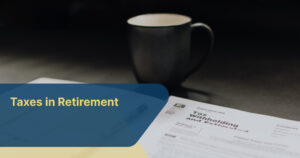
Taxes in Retirement are a problem, that many people do not have on their radar, but there is no getting around it. Although it was tax-exempt for a long time, the statutory pension has been subject to general income tax since 2005. Just as with the civil servant’s pension, dealing with it is largely the same as dealing with your salary tax. The pension thus falls under the personal tax rate.
Taxes in Retirement: How the tax on pensions came
The origin of the tax on pensions goes back to 2005, it is the year of the pension reforms. It had already become apparent, in the years and decades prior to that, that the statutory pension insurance system had fallen into disarray. Demographic change in particular had created problems for the funding of the pay-as-you-go system, and there was a danger of widespread poverty in old age.
Private pension provision as a solution
Instead of implementing a fundamental change, policymakers decided instead to promote private pension provisions. The real goal was to reduce the importance of state pension funds for retirement and instead use a mix of different pension products for this task. Individual retirees should become less dependent on the pension system and instead organize and finance their own retirement planning. Products such as the Rürup and Riester pensions were designed for this purpose, and the already existing company pension system was extended. As a special incentive to the citizen, the build-up of these supplementary pensions was to be tax-subsidized; which led to a problem.
Tax fairness
For reasons of tax fairness, a person’s income must be reported to the tax authorities at least once. Therefore, the new annuity products had to be taxed when they were paid out in old age in order to allow for the subsidy when they were paid in. Which, of course, is a significant disadvantage compared to a completely untaxed state pension. The whole reform would have been defeated by this. The solution was to end the tax-free status of the state pension.
Rentenfreibetrag
The very sudden introduction of the tax on pensions was, of course, not received joyfully by those affected. All those who had already retired or were about to retire had planned their retirement on the assumption that they would be able to use their full pension as net income. The new tax upset all these plans. Politicians therefore decided not to introduce it in one fell swoop, but to let it take effect gradually over several decades. The solution was the “Rentenfreibetrag”.
The “Rentenfreibetrag” is a percentage of the pension that is fully exempt from tax. When it was introduced in 2005, it was 50%, so all existing pensions were half tax-free and remain so. But by the next year, it had dropped to 48%. Anyone who became a pensioner now had to pay tax at a rate of 2% more. And this rate of 2% per year was maintained until 2020.
In that year, only 20% of the pension was tax-free. After that, the pension tax-free rate went to the next level, decreasing by a single percentage point per year. Anyone retiring in 2040 or later will thus have to pay tax on the entire amount.
Taxes in Retirement: Retirement and taxes
As already mentioned, the personal tax rate corresponds to the ordinary income tax. The total amount is figured out by adding up all relevant types of income and comparing it to one’s tax bracket. Due to the progressive nature of the tax system, a higher income also results in a higher percentage of taxes.
Besides pensions and salaries, various other types of income are also taken into account. In particular, rent as well as leases are to be mentioned, but also income from agriculture and forestry must always be stated here. This is not mandatory for profits from capital assets, but they may be declared voluntarily. This is a decision from which especially citizens with a low tax rate benefit. Altogether, one must estimate between 14% to 45% as tax, depending on the total income.
Final withholding tax and tax on sale of investment property
Complementing all of this is the final withholding tax. It is levied on various types of capital gains, such as interest, dividends, but also speculative gains. It is exempt from the tax progression and always amounts to 25% of the income. Regardless of how rich the saver himself is. As soon as it has been paid, the capital concerned is considered taxed and does not have to be mentioned elsewhere.
It covers both, recurring payments and single time gains from the sale of investment property. You could compare it to a capital gains tax. The only disadvantage is, that the money cannot be reclaimed through tax deductions and write-offs.
Grundfreibetrag
The „Grundfreibetrag“ is a lower limit for taxation. Like the entire tax, it is largely similar to the regulations for low-income professionals. Those whose total income is below this amount do not have to pay taxes. Even filling out a tax return only has to be done voluntarily or upon request, and is no longer mandatory.
Unfortunately, it is not always possible to name the exact threshold. Like social assistance, it is based on the amount needed to meet basic living expenses. However, due to inflation and the constantly changing price level, there are new adjustments to the basic allowance almost every year. In 2022, it was €9,984 for single persons and €19,968 for married persons. A somewhat higher sum than in 2021, in which the sums were still €9,744 as well as €19,488.
Germany’s estate tax
Less important for your retirement, but of some weight for your heirs, will be the estate tax. How high this will be, depends on the total amount of the legacy and how close the family relations were. Children and grandchildren will have to pay less than distant relatives.
Spouses and children are taxed in tax class I at 7% to 30%, depending on the value of the inheritance. Siblings or nieces and nephews slip into tax class II. They are subject to a tax rate of 15% to 43% of the total value. Persons not related to the decedent pay at least 30% inheritance tax in tax class III.
Taxes in Retirement: Other types of pensions
There are of course other kinds of pensions, besides the state system. They are treated a little bit different.
State-subsidized pensions
At the heart of this are state-subsidized pensions. In addition to the bAV, these are primarily Rürup and Riester pensions. These three products differed considerably in their implementation and in terms of their specifications. From the type of payout to the possible investments to the option to terminate the contract, there are significant differences between them. Fortunately, the issue of taxation is a major exception here.
They all benefit from tax exemptions when saving and building up the contract. In exchange, however, the entire benefit becomes taxable when it is paid out. All pensions from these sources must also be included in income tax. They are therefore treated in the same way as the statutory pension.
Private pensions
The situation is somewhat different for life insurance and private annuities. Unfortunately, these have also lost out somewhat compared to the past. Before the reform, it was still possible to enjoy the payout of a life insurance policy completely tax-free, but this time has also passed.
In principle, there are two options. Either you declare the earnings as income as well. Or you let them go through the final withholding tax. However, there is a special rule that significantly reduces the tax burden.
The 12/62 rule
This is a tax relief for private life and pension insurance policies. Anyone who has held a contract for at least 12 years and has reached the age of 62 no longer has to pay tax on the full amount for income tax purposes, but only the half. This is a strong alternative to the final withholding tax, as the taxable portion is now only between 7% and 22.5% instead of 25%.
If you even decide to receive your pension, you only have to pay tax on a predefined share of the income. The exact table can be found in the German Income Tax Act (EStG) § 22. Since this share depends on one’s age, it decreases even further over time! At 67, only 17% of the pension has to be taxed, making the private pension a perfectly viable alternative for retirement.
Conclusion
If you take all factors into account, the taxation of your pension is rather annoying, but not too difficult to understand. For the biggest part, it is merely a continuation of the income tax, that you have to pay for your normal working income. Only that the money will no longer come from an employer, but the pension scheme. Almost all the state supported products, follow the same principal. Only the fully private pension insurance and your independent investments, allow tax befits in old age.
Of course, this may lead to shortages and a lack of usable income in a phase of your life, where every bit counts. To counter this, it is paramount to plan accordingly. As shown, there is a wide array of different products, that can help you to improve your financial situation. By using these options and investing your money ahead of time, you can grow your future income and reduce the risk of poverty in old age.
If you need help with that, we would be delighted to support you with our advice. Please do not hesitate to contact us and ask your questions directly. Many problems are on an individual level and can only be solved by personal consultation. But they are not unsolvable and the earlier to get care of them, the better.


